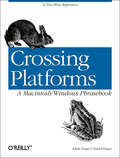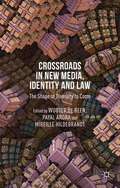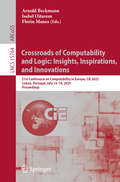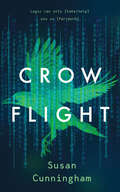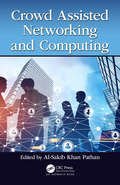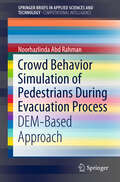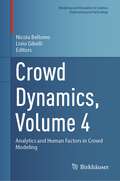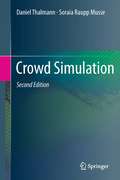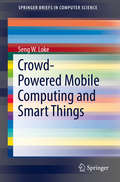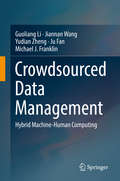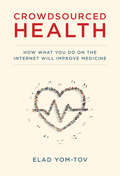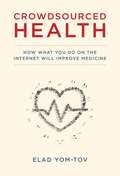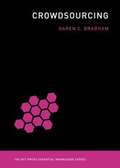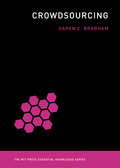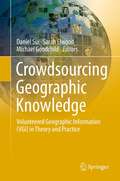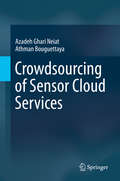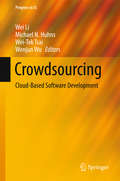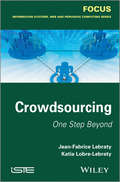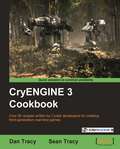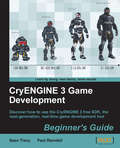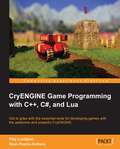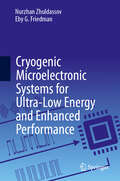- Table View
- List View
Crossing Platforms A Macintosh/Windows Phrasebook: A Dictionary for Strangers in a Strange Land
by David Pogue Adam EngstLike travelers in a foreign land, Mac users working in Windows or Windows users working on a Mac often find themselves in unfamiliar territory with no guidebook. Crossing Platforms: A Macintosh/Windows Phrasebook, with information presented in a translation dictionary-like format, offers users a handy way of translating skills and knowledge from one platform to the other. Whether it's explaining the difference between Macintoshaliases and Windows shortcuts or explaining how a Windows user would go about setting up Internet access on a Mac, this book provides readers a simple means to look up familiar interface elements and system features and learn how that element or feature works on the other platform.Crossing Platforms: A Macintosh/Windows Phrasebook includes:A general introduction to the key differences between the Mac and WindowsA to Z sections for each platform: one section where Mac users look up familiar Macintosh terms to find the equivalent function in Windows along with an explanation of the differences; and another section where Windows users find familiar Windows terms with pointers to the Macintosh equivalent along with full descriptions of how the function works on the Mac and important differences between the two platformsThe complete translation dictionary-like reference book,Crossing Platforms: A Macintosh/Windows Phrasebook provides a simple solution for everyone who has been confused and frustrated by the arbitrary and sometimes capricious differences between the Macintosh and Windows operating systems. This book bridges the Mac-PC knowledge gap many users are faced with when work or preference demands the use of both a PC and Mac. Whether you already know the Macintosh or Windows, this book helps you navigate in the other operating system using your existing skills and knowledge.
Crossroads in New Media, Identity and Law
by Mireille Hildebrandt Wouter De Been Payal AroraThis volume brings together a number of timely contributions at the nexus of new media, politics and law. The central intuition that ties these essays together is that information and communication technology, cultural identity, and legal and political institutions are spheres that co-evolve and interpenetrate in myriad ways. Discussing these shifting relationships, the contributions all probe the question of what shape diversity will take as a result of the changes in the way we communicate and spread information: that is, are we heading to the disintegration and fragmentation of national and cultural identity, or is society moving towards more consolidation, standardization and centralization at a transnational level? In an age of digitization and globalization, this book addresses the question of whether this calls for a new civility fit for the 21st century.
Crossroads of Computability and Logic: 21st Conference on Computability in Europe, CiE 2025, Lisbon, Portugal, July 14–18, 2025, Proceedings (Lecture Notes in Computer Science #15764)
by Florin Manea Arnold Beckmann Isabel OitavemThis book constitutes the refereed proceedings of the 21st Conference on Computability and Logic, CiE 2025, held in Lisbon, Portugal, during July 14–18, 2025. The 27 full papers included in this book were carefully reviewed and selected from 49 submissions. They focus on computability-related science, ranging over mathematics, computer science and applications in various natural and engineering sciences, such as physics and biology, as well as related fields, such as philosophy and history of computing. CiE 2025 hadas its motto Crossroads of Computability and Logic: Insights, Inspirations, and Innovations, drawing on the numerous interconnections between computability research and broader logical methodologies, considering both well-established perspectives as well as recent innovations.
Crossy Road Guía de Juego
by Hiddenstuff Entertainment António José Leite da Silva CorreiaComrpando este guia de jogo avançado e detalhado, eis o que irás obter: - Dicas profissionais e estratégias. - Cheats e Hacks. - Segredos, dicas, cheats, desbloqueadores e truques usados pelos jogadores Pro! - Como obter dinheiro e moedas em abundância. - E MUITO MAIS! Todas as versões deste guia têm imagens que te ajudam a compreender melhor o jogo. Não há um guia tão compreensivo e avançado como este. Estarás satisfeito com este guia e irás beneficiar muito mais quando comparado com outros guias que andam por aí. Compra agora e derrota os teus adversários. Torna-te hoje um jogador Pro!
Crow Flight
by Susan CunninghamThe curious flight patterns of crows lead a teen computer programmer down a path of mystery and romance.Gin trusts logic a little too much. She even designs programs to decide what to eat and how to spend her time. All that changes when she's paired with a new transfer student, Felix, on a computer modeling assignment to explain certain anomalies in the behavior of crows.Speaking of anomalies, why is Gin so disappointed that Felix isn't a match for her in the dating app she's designing with local gamers?As she enters Felix's world and digs further into the data behind crow behavior, Gin uncovers a terrible secret. And the wrong decision could equal disaster squared...
Crowd Assisted Networking and Computing
by Al-Sakib Khan PathanCrowd computing, crowdsourcing, crowd-associated network (CrAN), crowd-assisted sensing are some examples of crowd-based concepts that harness the power of people on the web or connected via web-like infrastructure to do tasks that are often difficult for individual users or computers to do alone. This creates many challenging issues like assessing reliability and correctness of crowd generated information, delivery of data and information via crowd, middleware for supporting crowdsourcing and crowd computing tasks, crowd associated networking and its security, Quality of Information (QoI) issues, etc. This book compiles the latest advances in the relevant fields.
Crowd Behavior Simulation of Pedestrians During Evacuation Process: Dem-based Approach (SpringerBriefs in Applied Sciences and Technology)
by Noorhazlinda Abd RahmanThis book introduces the use of the distinct element method (DEM) in modeling crowd behavior and simulating evacuation processes. Focusing on the mathematical computation of the uncertain behavior of evacuees, which is switching action behavior, it subsequently reproduces the crowd evacuation process under several conjectural scenarios using a DEM-based multi-agent model that has been modified by introducing the switching action behavior. The proposed switching action behavior model describes a person who has to change his/her destination due to the limited space capacity of the designated evacuation area. The change in the destination of a person is determined according to the motion of other individuals in the perception domain during the defined switching action time. The switching action time is formulated in the so-called switching action function, which is described by a convolution integral of the input and unit response functions. The newly developed switching action model is then validated using sensitivity analysis in which the primary focus is the crowd motion and flow of switching action behavior.
Crowd Dynamics, Volume 4: Analytics and Human Factors in Crowd Modeling (Modeling and Simulation in Science, Engineering and Technology)
by Nicola Bellomo Livio GibelliThis contributed volume explores innovative research in the modeling, simulation, and control of crowd dynamics. Chapter authors approach the topic from the perspectives of mathematics, physics, engineering, and psychology, providing a comprehensive overview of the work carried out in this challenging interdisciplinary research field. The volume begins with an overview of analytical problems related to crowd modeling. Attention is then given to the importance of considering the social and psychological factors that influence crowd behavior – such as emotions, communication, and decision-making processes – in order to create reliable models. Finally, specific features of crowd behavior are explored, including single-file traffic, passenger movement, modeling multiple groups in crowds, and the interplay between crowd dynamics and the spread of disease.Crowd Dynamics, Volume 4 is ideal for mathematicians, engineers, physicists, and other researchers working in the rapidly growing field of modeling and simulation of human crowds.
Crowd Simulation
by Daniel Thalmann Soraia Raupp MusseResearch into the methods and techniques used in simulating crowds has developed extensively within the last few years, particularly in the areas of video games and film. Despite recent impressive results when simulating and rendering thousands of individuals, many challenges still exist in this area. The comparison of simulation with reality, the realistic appearance of virtual humans and their behavior, group structure and their motion, and collision avoidance are just some examples of these challenges. For most of the applications of crowds, it is now a requirement to have real-time simulations - which is an additional challenge, particularly when crowds are very large. Crowd Simulation analyses these challenges in depth and suggests many possible solutions. Daniel Thalmann and Soraia Musse share their experiences and expertise in the application of: · Population modeling · Virtual human animation · Behavioral models for crowds · The connection between virtual and real crowds · Path planning and navigation · Visual attention models · Geometric and populated semantic environments · Crowd rendering The second edition presents techniques and methods developed since the authors first covered the simulation of crowds in 2007. Crowd Simulation includes in-depth discussions on the techniques of path planning, including a new hybrid approach between navigation graphs and potential-based methods. The importance of gaze attention - individuals appearing conscious of their environment and of others - is introduced, and a free-of-collision method for crowds is also discussed.
Crowd-Powered Mobile Computing and Smart Things
by Seng W. LokeThis SpringerBrief provides a synergistic overview of technology trends by emphasizing five linked perspectives: crowd+cloud machines, extreme cooperation with smart things, scalable context-awareness, drone services for mobile crowds and social links in mobile crowds. The authors also highlight issues and challenges at the intersection of these trends. Topics covered include cloud computing, Internet of Things, mobile and wearable computing, crowd computing, the culture of thing sharing, collective computing, and swarm dynamics. The brief is a useful resource and a starting point for researchers, students or anyone interested in the contemporary computing landscape.
Crowdsourced Data Management: Hybrid Machine-Human Computing
by Guoliang Li Jiannan Wang Yudian Zheng Ju Fan Michael J. FranklinThis book provides an overview of crowdsourced data management. Covering all aspects including the workflow, algorithms and research potential, it particularly focuses on the latest techniques and recent advances. The authors identify three key aspects in determining the performance of crowdsourced data management: quality control, cost control and latency control. By surveying and synthesizing a wide spectrum of studies on crowdsourced data management, the book outlines important factors that need to be considered to improve crowdsourced data management. It also introduces a practical crowdsourced-database-system design and presents a number of crowdsourced operators. Self-contained and covering theory, algorithms, techniques and applications, it is a valuable reference resource for researchers and students new to crowdsourced data management with a basic knowledge of data structures and databases.
Crowdsourced Health: How What You Do on the Internet Will Improve Medicine
by Elad Yom-TovHow data from our health-related Internet searches can lead to discoveries about diseases and symptoms and help patients deal with diagnoses. Most of us have gone online to search for information about health. What are the symptoms of a migraine? How effective is this drug? Where can I find more resources for cancer patients? Could I have an STD? Am I fat? A Pew survey reports more than 80 percent of American Internet users have logged on to ask questions like these. But what if the digital traces left by our searches could show doctors and medical researchers something new and interesting? What if the data generated by our searches could reveal information about health that would be difficult to gather in other ways? In this book, Elad Yom-Tov argues that Internet data could change the way medical research is done, supplementing traditional tools to provide insights not otherwise available. He describes how studies of Internet searches have, among other things, already helped researchers track to side effects of prescription drugs, to understand the information needs of cancer patients and their families, and to recognize some of the causes of anorexia. Yom-Tov shows that the information collected can benefit humanity without sacrificing individual privacy. He explains why people go to the Internet with health questions; for one thing, it seems to be a safe place to ask anonymously about such matters as obesity, sex, and pregnancy. He describes in detrimental effects of “pro-anorexia” online content; tells how computer scientists can scour search engine data to improve public health by, for example, identifying risk factors for disease and centers of contagion; and tells how analyses of how people deal with upsetting diagnoses help doctors to treat patients and patients to understand their conditions.
Crowdsourced Health: How What You Do on the Internet will Improve Medicine
by Elad Yom-TovMost of us have gone online to search for information about health. What are the symptoms of a migraine? How effective is this drug? Where can I find more resources for cancer patients? Could I have an STD? Am I fat? A Pew survey reports more than 80 percent of American Internet users have logged on to ask questions like these. But what if the digital traces left by our searches could show doctors and medical researchers something new and interesting? What if the data generated by our searches could reveal information about health that would be difficult to gather in other ways? In this book, Elad Yom-Tov argues that Internet data could change the way medical research is done, supplementing traditional tools to provide insights not otherwise available. He describes how studies of Internet searches have, among other things, already helped researchers track to side effects of prescription drugs, to understand the information needs of cancer patients and their families, and to recognize some of the causes of anorexia. Yom-Tov shows that the information collected can benefit humanity without sacrificing individual privacy. He explains why people go to the Internet with health questions; for one thing, it seems to be a safe place to ask anonymously about such matters as obesity, sex, and pregnancy. He describes in detrimental effects of "pro-anorexia" online content; tells how computer scientists can scour search engine data to improve public health by, for example, identifying risk factors for disease and centers of contagion; and tells how analyses of how people deal with upsetting diagnoses help doctors to treat patients and patients to understand their conditions.
Crowdsourcing
by Daren C. BrabhamEver since the term "crowdsourcing" was coined in 2006 by Wired writer Jeff Howe, group activities ranging from the creation of the Oxford English Dictionary to the choosing of new colors for M&Ms have been labeled with this most buzz-generating of media buzzwords. In this accessible but authoritative account, grounded in the empirical literature, Daren Brabham explains what crowdsourcing is, what it is not, and how it works. Crowdsourcing, Brabham tells us, is an online, distributed problem solving and production model that leverages the collective intelligence of online communities for specific purposes set forth by a crowdsourcing organization -- corporate, government, or volunteer. Uniquely, it combines a bottom-up, open, creative process with top-down organizational goals. Crowdsourcing is not open source production, which lacks the top-down component; it is not a market research survey that offers participants a short list of choices; and it is qualitatively different from predigital open innovation and collaborative production processes, which lacked the speed, reach, rich capability, and lowered barriers to entry enabled by the Internet. Brabham describes the intellectual roots of the idea of crowdsourcing in such concepts as collective intelligence, the wisdom of crowds, and distributed computing. He surveys the major issues in crowdsourcing, including crowd motivation, the misconception of the amateur participant, crowdfunding, and the danger of "crowdsploitation" of volunteer labor, citing real-world examples from Threadless, InnoCentive, and other organizations. And he considers the future of crowdsourcing in both theory and practice, describing its possible roles in journalism, governance, national security, and science and health.
Crowdsourcing (The MIT Press Essential Knowledge series)
by Daren C. BrabhamA concise introduction to crowdsourcing that goes beyond social media buzzwords to explain what crowdsourcing really is and how it works.Ever since the term “crowdsourcing” was coined in 2006 by Wired writer Jeff Howe, group activities ranging from the creation of the Oxford English Dictionary to the choosing of new colors for M&Ms have been labeled with this most buzz-generating of media buzzwords. In this accessible but authoritative account, grounded in the empirical literature, Daren Brabham explains what crowdsourcing is, what it is not, and how it works.Crowdsourcing, Brabham tells us, is an online, distributed problem solving and production model that leverages the collective intelligence of online communities for specific purposes set forth by a crowdsourcing organization—corporate, government, or volunteer. Uniquely, it combines a bottom-up, open, creative process with top-down organizational goals. Crowdsourcing is not open source production, which lacks the top-down component; it is not a market research survey that offers participants a short list of choices; and it is qualitatively different from predigital open innovation and collaborative production processes, which lacked the speed, reach, rich capability, and lowered barriers to entry enabled by the Internet.Brabham describes the intellectual roots of the idea of crowdsourcing in such concepts as collective intelligence, the wisdom of crowds, and distributed computing. He surveys the major issues in crowdsourcing, including crowd motivation, the misconception of the amateur participant, crowdfunding, and the danger of “crowdsploitation” of volunteer labor, citing real-world examples from Threadless, InnoCentive, and other organizations. And he considers the future of crowdsourcing in both theory and practice, describing its possible roles in journalism, governance, national security, and science and health.
Crowdsourcing Geographic Knowledge: Volunteered Geographic Information (VGI) in Theory and Practice
by Sarah Elwood Michael Goodchild Daniel SuiThe phenomenon of volunteered geographic information is part of a profound transformation in how geographic data, information, and knowledge are produced and circulated. By situating volunteered geographic information (VGI) in the context of big-data deluge and the data-intensive inquiry, the 20 chapters in this book explore both the theories and applications of crowdsourcing for geographic knowledge production with three sections focusing on 1). VGI, Public Participation, and Citizen Science; 2). Geographic Knowledge Production and Place Inference; and 3). Emerging Applications and New Challenges. This book argues that future progress in VGI research depends in large part on building strong linkages with diverse geographic scholarship. Contributors of this volume situate VGI research in geography's core concerns with space and place, and offer several ways of addressing persistent challenges of quality assurance in VGI. This book positions VGI as part of a shift toward hybrid epistemologies, and potentially a fourth paradigm of data-intensive inquiry across the sciences. It also considers the implications of VGI and the exaflood for further time-space compression and new forms, degrees of digital inequality, the renewed importance of geography, and the role of crowdsourcing for geographic knowledge production.
Crowdsourcing of Sensor Cloud Services
by Athman Bouguettaya Azadeh Ghari NeiatThis book develops a crowdsourced sensor-cloud service composition framework taking into account spatio-temporal aspects. This book also unfolds new horizons to service-oriented computing towards the direction of crowdsourced sensor data based applications, in the broader context of Internet of Things (IoT). It is a massive challenge for the IoT research field how to effectively and efficiently capture, manage and deliver sensed data as user-desired services. The outcome of this research will contribute to solving this very important question, by designing a novel service framework and a set of unique service selection and composition frameworks.Delivering a novel service framework to manage crowdsourced sensor data provides high-level abstraction (i.e., sensor-cloud service) to model crowdsourced sensor data from functional and non-functional perspectives, seamlessly turning the raw data into “ready to go” services. A creative indexing model is developed to capture and manage the spatio-temporal dynamism of crowdsourced service providers.Delivering novel frameworks to compose crowdsourced sensor-cloud services is vital. These frameworks focuses on spatio-temporal composition of crowdsourced sensor-cloud services, which is a new territory for existing service oriented computing research. A creative failure-proof model is also designed to prevent composition failure caused by fluctuating QoS.Delivering an incentive model to drive the coverage of crowdsourced service providers is also vital. A new spatio-temporal incentive model targets changing coverage of the crowdsourced providers to achieve demanded coverage of crowdsourced sensor-cloud services within a region.The outcome of this research is expected to potentially create a sensor services crowdsourcing market and new commercial opportunities focusing on crowdsourced data based applications. The crowdsourced community based approach adds significant value to journey planning and map services thus creating a competitive edge for a technologically-minded companies incentivizing new start-ups, thus enabling higher market innovation.This book primarily targets researchers and practitioners, who conduct research work in service oriented computing, Internet of Things (IoT), smart city and spatio-temporal travel planning, as well as advanced-level students studying this field. Small and Medium Entrepreneurs, who invest in crowdsourced IoT services and journey planning infrastructures, will also want to purchase this book.
Crowdsourcing: Cloud-Based Software Development (Progress in IS)
by Wei Li Michael N. Huhns Wei-Tek Tsai Wenjun WuThis book presents the latest research on the software crowdsourcing approach to develop large and complex software in a cloud-based platform. It develops the fundamental principles, management organization and processes, and a cloud-based infrastructure to support this new software development approach. The book examines a variety of issues in software crowdsourcing processes, including software quality, costs, diversity of solutions, and the competitive nature of crowdsourcing processes. Furthermore, the book outlines a research roadmap of this emerging field, including all the key technology and management issues for the foreseeable future. Crowdsourcing, as demonstrated by Wikipedia and Facebook for online web applications, has shown promising results for a variety of applications, including healthcare, business, gold mining exploration, education, and software development. Software crowdsourcing is emerging as a promising solution to designing, developing and maintaining software. Preliminary software crowdsourcing practices and platforms, including Apple's App Store and TopCoder, demonstrate the advantages of crowdsourcing in terms of software ecosystem expansion and product quality improvement.
Crowdsourcing: One Step Beyond
by Katia Lobre-Lebraty Jean-Fabrice LebratyCrowdsourcing is a relatively recent phenomenon that only appeared in 2006, but it continues to grow and diversify (crowdfunding, crowdcontrol, etc.). This book aims to review this concept and show how it leads to the creation of value and new business opportunities. Chapter 1 is based on four examples: the online-banking sector, an informative television channel, the postal sector and the higher education sector. It shows that in the current context, for a company facing challenges, the crowd remains an untapped resource. The next chapter presents crowdsourcing as a new form of externalization and offers definitions of crowdsourcing. In Chapter 3, the authors attempt to explain how a company can create value by means of a crowdsourcing operation. To do this, authors use a model linking types of value, types of crowd, and the means by which these crowds are accessed. Chapter 4 examines in detail various forms that crowdsourcing may take, by presenting and discussing ten types of crowdsourcing operation. In Chapter 5, the authors imagine and explore the ways in which the dark side of crowdsourcing might be manifested and Chapter 6 offers some insight into the future of crowdsourcing. Contents 1. A Turbulent and Paradoxical Environment. 2. Crowdsourcing: A New Form of Externalization. 3. Crowdsourcing and Value Creation. 4. Forms of Crowdsourcing. 5. The Dangers of Crowdsourcing. 6. The Future of Crowdsourcing. About the Authors Jean-Fabrice Lebraty is Professor of management sciences at IAE (Business School) at Jean Moulin – Lyon 3 University in France and a member of the research laboratory Magellan EA3713. He specializes in the management of information and communication systems and his research notably concerns decision-making and the links between crowd and information technology. Katia Lobre-Lebraty is Associate Professor of management sciences at IAE (Business School) at Jean Moulin – Lyon 3 University in France and a member of the research laboratory Magellan EA3713. She specializes in management control and strategic management and her research concerns both the modes of governance of organizations and Open Data
Crush It!: Why NOW Is the Time to Cash In on Your Passion
by Gary VaynerchukIn Crush It!, online marketing trailblazer Gary Vaynerchuk tells business owners what they need to do to boost their sales using the internet—just as he has done to build his family’s wine store from a $4 million business to a $60 million one. Crush It! will show readers how to find their passion, then step by step how to turn it into a flourishing, monetized business.
Crushing It!: How Great Entrepreneurs Build Their Business and Influence—and How You Can, Too
by Gary VaynerchukFour-time New York Times bestselling author Gary Vaynerchuk offers new lessons and inspiration drawn from the experiences of dozens of influencers and entrepreneurs who rejected the predictable corporate path in favor of pursuing their dreams by building thriving businesses and extraordinary personal brands.In his 2009 international bestseller Crush It, Gary insisted that a vibrant personal brand was crucial to entrepreneurial success, In Crushing It!, Gary explains why that’s even more true today, offering his unique perspective on what has changed and what principles remain timeless. He also shares stories from other entrepreneurs who have grown wealthier—and not just financially—than they ever imagined possible by following Crush It principles. The secret to their success (and Gary’s) has everything to do with their understanding of the social media platforms, and their willingness to do whatever it took to make these tools work to their utmost potential. That’s what Crushing It! teaches readers to do.In this lively, practical, and inspiring book, Gary dissects every current major social media platform so that anyone, from a plumber to a professional ice skater, will know exactly how to amplify his or her personal brand on each. He offers both theoretical and tactical advice on how to become the biggest thing on old standbys like Twitter, Facebook, YouTube, Instagram, Pinterest, and Snapchat; podcast platforms like Spotify, Soundcloud, iHeartRadio, and iTunes; and other emerging platforms such as Musical.ly. For those with more experience, Crushing It! illuminates some little-known nuances and provides innovative tips and clever tweaks proven to enhance more common tried-and-true strategies.Crushing It! is a state-of-the-art guide to building your own path to professional and financial success, but it’s not about getting rich. It’s a blueprint to living life on your own terms.
CryENGINE 3 Cookbook
by Dan TracyWritten in a cookbook style, this book offers solutions using a recipe based approach. Each recipe contains step-by-step instructions followed by an analysis of what was done in each task and other useful information. The cookbook approach means you can dive into whatever recipes you want in no particular order. The CryENGINE3 Cookbook is written to be accessible to all developers currently using the CryENGINE3. It also explores the depth and power of the CryENGINE3 and is a useful guide to follow when becoming familiar with this award winning middle-ware game engine. This book is written with the casual and professional developer in mind. Fundamental knowledge of some Digital Content Creation Tools, like Photoshop and 3d Studio Max is required. The Software Development Kit version of the CryENGINE is used for all examples, so the reader should have a version of the development kit to follow the recipes contained in this book.
CryENGINE 3 Game Development: Beginner's Guide
by Sean TracyA step by step beginner's tutorial to creating AAA style games with the complete game creation tool, CryENGINE 3,This book is written with the beginner and casual developer in mind. The freely available version of the CryENGINE® 3 is used for all examples in this book.
CryENGINE Game Programming with C++, C#, and Lua
by Filip Lundgren Ruan Pearce-AuthersThis book provides you with step-by-step exercises covering the various systems of CryENGINE and comprehensively explains their workings in a way that can be easily understood by readers of any skill level to help you develop your very own CryENGINE games.This book is intended for developers looking to harness the power of CryENGINE, providing a good grounding in how to use the engine to its full potential. The book assumes basic knowledge of the engine and its editor in non-programming areas.
Cryogenic Microelectronic Systems for Ultra-Low Energy and Enhanced Performance
by Eby G. Friedman Nurzhan ZhuldassovThis book explores cryogenic computers to achieve faster operation and lower energy use. As computer components become smaller and generate more heat, traditional cooling methods struggle to keep up. By operating at cryogenic temperatures, these limitations can be overcome—reducing heat, improving performance, and opening new possibilities for important applications such as large scale data centers and quantum computers. The approaches and physical models discussed in this book are valuable since these concepts offer a practical methodology for increasing computational computing power without being limited by heat and power dissipation. The book explores how cryogenic temperatures can supercharge computing. Novel methods for designing and optimizing computer systems that operate at extremely low temperatures, improve performance, reduce power consumption, and tackle the fundamental physical limits faced by modern electronics are introduced in this book. From foundational physics-based principles and cryogenic equipment to innovative graph theoretic design, the book offers a fresh look at the future of high performance, energy efficient computing.
